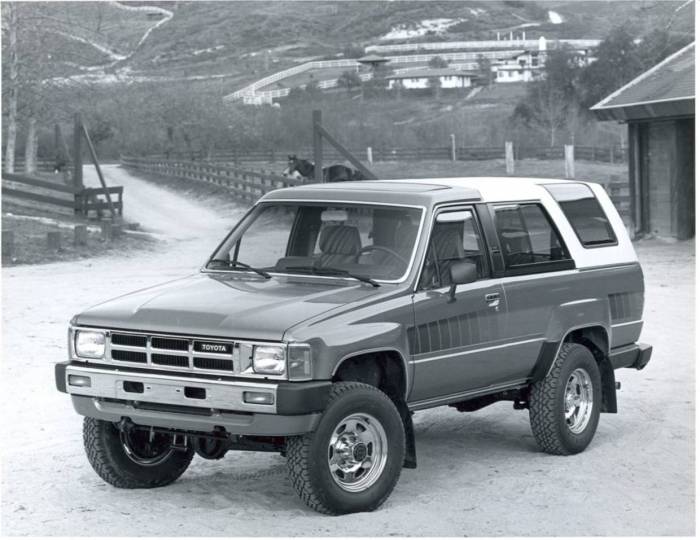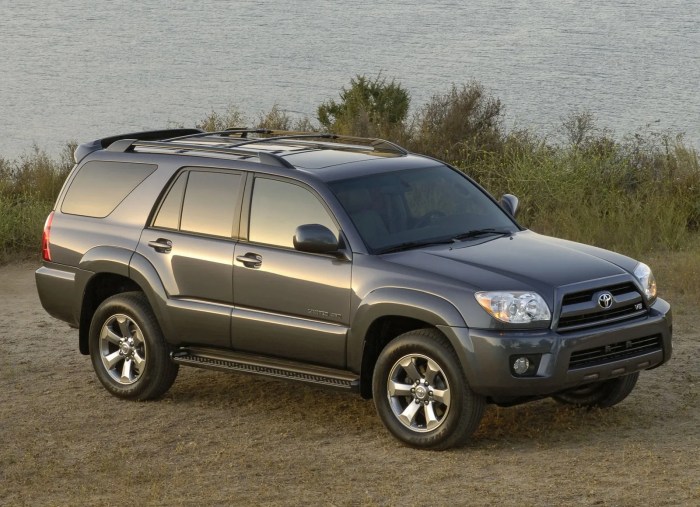The Toyota 4Runner, a name synonymous with off-road capability and enduring reliability, boasts a rich history spanning decades. From its humble beginnings as a derivative of the Hilux pickup truck to its current iteration as a sophisticated SUV, the 4Runner’s evolution reflects changing automotive trends while maintaining its core identity: a vehicle built to conquer any terrain.
The Early Years: A Hilux-Based Legacy (1984-1989)
The first-generation 4Runner (1984-1989), officially known as the Toyota 4Runner, emerged as a compact SUV built on the chassis of the robust Toyota Hilux pickup truck. This lineage immediately established its rugged credentials. Its boxy design, high ground clearance, and available four-wheel drive made it a popular choice for adventurers and off-road enthusiasts. Mechanically, it shared many components with the Hilux, ensuring parts availability and relative simplicity.
Key features included a removable rear roof panel, adding to its versatility. This generation laid the foundation for the 4Runner’s reputation for durability and off-road prowess. It was available in both two-door and four-door configurations, catering to various needs.
Key Features of the First Generation:
- Hilux-based chassis
- Removable rear roof panel
- Available four-wheel drive
- Simple, reliable mechanics
- Two-door and four-door options
Refinement and Growth: Second and Third Generations (1990-2002)
The second generation (1990-1995) saw a significant shift towards a more refined design, though it retained its off-road capabilities. The body-on-frame construction continued, providing a solid foundation for tackling challenging terrain. This generation introduced a more car-like interior, improved comfort features, and more powerful engine options. The shift towards a more comfortable driving experience broadened the 4Runner’s appeal to a wider audience.
The third generation (1996-2002) built upon this success, further refining the design and incorporating advanced features like improved suspension and more sophisticated safety systems. This generation also saw an increase in size and passenger space, solidifying its position as a practical family vehicle with off-road capabilities.
Evolution of the Second and Third Generations:
- More refined styling
- Improved comfort and interior features
- More powerful engine options
- Enhanced safety features
- Increased size and passenger capacity
Modern Era: Sophistication Meets Capability (2003-Present)
The fourth generation (2003-2009) marked a significant design departure, moving towards a more rounded and aerodynamic profile. While the ruggedness remained, the focus shifted towards a more on-road-oriented driving experience. This generation featured a more luxurious interior and a wider array of technological advancements. The fifth generation (2010-present) continued this trend, offering a blend of off-road capability and on-road comfort.

Source: amazonaws.com
It refined the design further, incorporating advanced safety technologies, improved fuel efficiency, and a more sophisticated infotainment system. The current model retains the iconic 4Runner design cues while incorporating modern amenities and safety features. The emphasis on off-road capability persists, with various trim levels catering to different levels of adventure.
Modern 4Runner Highlights:
- Improved on-road driving dynamics
- More luxurious interiors
- Advanced safety technologies
- Enhanced fuel efficiency (relative to previous generations)
- Sophisticated infotainment systems
The 4Runner’s Enduring Appeal: A Blend of Heritage and Modernity
The Toyota 4Runner’s enduring success lies in its ability to consistently balance off-road capability with everyday practicality. Its history demonstrates a commitment to continuous improvement, adapting to changing consumer preferences while retaining its core identity. The 4Runner remains a popular choice for those seeking a vehicle that can handle both city streets and challenging trails. Its reliability and resale value are legendary, making it a smart investment for both adventurers and families alike.
The body-on-frame construction, a hallmark of its lineage, continues to provide a solid foundation for its off-road capabilities, a testament to its heritage.
Frequently Asked Questions (FAQs)
- Q: Is the Toyota 4Runner a good off-road vehicle? A: Yes, the 4Runner has a long-standing reputation for its off-road capabilities, particularly with its available four-wheel-drive system and high ground clearance.
- Q: How reliable is the Toyota 4Runner? A: Toyota 4Runners are generally known for their exceptional reliability and longevity. They often maintain high resale values.
- Q: What are the different trim levels available for the 4Runner? A: The 4Runner typically offers various trim levels, ranging from more basic models to higher-end versions with additional features and capabilities. Specific trim levels vary by model year.
- Q: What kind of fuel economy can I expect from a 4Runner? A: Fuel economy varies depending on the model year and engine, but generally, 4Runners offer decent fuel economy for an SUV of its size and capability.
- Q: Is the 4Runner a good family vehicle? A: While known for its off-road prowess, the 4Runner also offers ample passenger space and cargo room, making it a suitable option for families.
Sources
- Toyota 4Runner Official Website
- Edmunds Toyota 4Runner Review
- Car and Driver Toyota 4Runner Review
- (Add other reputable sources as needed)
Call to Action
Ready to experience the legendary Toyota 4Runner? Visit your local Toyota dealership today for a test drive and explore the model that best suits your adventurous spirit and lifestyle!
FAQ
What is the 4Runner’s biggest competitor?
The Jeep Wrangler and Chevrolet Tahoe are often cited as major competitors, depending on the specific 4Runner trim and features.
What are the common problems with older 4Runners?

Source: carbuzzimages.com
Older models can experience issues with rust, transmission problems, and suspension wear, depending on maintenance and usage.
Is the 4Runner a good off-road vehicle?
Yes, particularly earlier models, known for their rugged build and capable four-wheel-drive systems. Even newer models offer respectable off-road capabilities.
How much does a used 4Runner cost?
The price varies greatly depending on the year, model, condition, and mileage. Researching specific models on used car websites is recommended.
